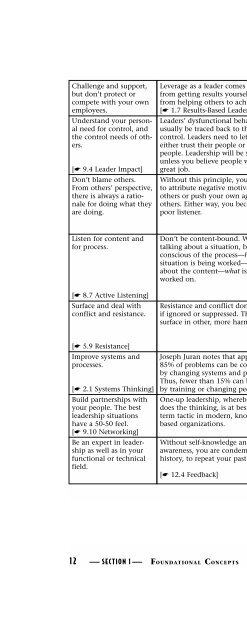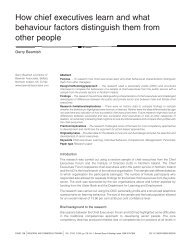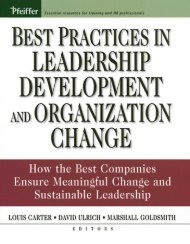- Page 4:
Copyright © 2001 by McGraw-Hill. A
- Page 14:
➠ 8.4 Levels of Communicating: De
- Page 18:
➠ 13.9 Human Capital: Truly the M
- Page 22:
1.10 The GAS model: Designing pract
- Page 26:
S ECTION 5—TOOLS FOR L EADING C H
- Page 30: 7.8 Affinity diagrams: Organizing m
- Page 34: 10.9 Making information visible 323
- Page 38: 13.8 Job Competencies: Measuring an
- Page 42: HOW TO USE AND BENEFITFROM THIS BOO
- Page 46: locate and use the exact tool for y
- Page 50: If your need is:Look for these reso
- Page 54: The Leadership GurusJohnson, BarryJ
- Page 58: ACKNOWLEDGMENTSA book is never the
- Page 62: 1.1L EADERSHIP IN THE T WENTY-FIRST
- Page 66: Information[☛ 2.2 7S Model]Leader
- Page 70: H OW TO USE THIS LEADERSHIP TOOL“
- Page 74: 1.3H OW E FFECTIVE L EADERS A CT: A
- Page 78: F OUR STEPS TO IMPROVING YOUR LEADE
- Page 84: H OW TO USE THIS LEADERSHIP TOOL“
- Page 88: 1.5 T HE B ASIC H ABITS AND P RACTI
- Page 92: Keepperspective.(Put first thingsfi
- Page 96: Major concernsas a leaderLeadership
- Page 100: 1.7 T HE L EADERSHIP R ESULTS E QUA
- Page 104: WEB WORKSHEETUse this matrix to spa
- Page 108: 1.8 R ECURSIVE L EADERSHIP:T HE L O
- Page 112: Creativity andinnovationTeamworkQua
- Page 116: 1.9 U NDERSTANDING THE T HINKINGB E
- Page 120: ➠ People feel a loss of control o
- Page 124: 1.10 T HE GAS MODEL: DESIGNINGP RAC
- Page 128: Level of Simplicityneeded and whyTr
- Page 132:
or little? Active or passive? If ye
- Page 136:
2TOOLS FOR BIG-PICTURETHINKINGOne o
- Page 140:
To illustrate systems thinking, we
- Page 144:
tance from those interacting system
- Page 148:
2.2T HE 7S MODEL: ALIGNING FOR S UC
- Page 152:
StrategyHow will this initiative su
- Page 156:
Levels of Statements1. High-Level S
- Page 160:
2.4 V ISIONING AND V ISION S TATEME
- Page 164:
2. Vet with some key stakeholders:
- Page 168:
2.5 V ALUES AND L EADERSHIPInspired
- Page 172:
A gang of thieves can share values,
- Page 176:
2.6C LARIFYING P URPOSE: HARNESSING
- Page 180:
purpose comes as a result of allowi
- Page 184:
Action Plan: As you write your inte
- Page 188:
2.8M EASURING S UCCESS: THE B ALANC
- Page 192:
WEB WORKSHEETThink about a balanced
- Page 196:
3.1 T HE L EADER A S S TRATEGISTIns
- Page 200:
Think outside thebox.Think of youro
- Page 204:
3.2T HE S IGMOID C URVE: ANTICIPATI
- Page 208:
Reflect on the significance of wher
- Page 212:
C HECKLIST OF POSSIBLE PLACES TO LO
- Page 216:
3.4T HE F UNDAMENTALS OF B USINESS-
- Page 220:
Business-Unit Goals[☛ 2.7 Goal St
- Page 224:
UniqueGenericHigh Value-AddedChange
- Page 228:
WEB WORKSHEETS TRATEGIC R ESOURCING
- Page 232:
H OW TO USE THIS LEADERSHIP TOOL“
- Page 236:
3.7RAIR LOGIC: ALIGNING C USTOMERS,
- Page 240:
Given the information you have prov
- Page 244:
High ConceptualPhase 1: Alliance Co
- Page 248:
R ELATED LEADERSHIP TOOLS2.3 Direct
- Page 252:
➎Integratethis strategyinto amark
- Page 256:
R ELATED LEADERSHIP TOOLS1.6 Boards
- Page 260:
4.1D ESIGNING P RODUCTIVE O RGANIZA
- Page 264:
H OW TO USE THIS LEADERSHIP TOOL“
- Page 268:
4.2 H IERARCHY: LEADERSHIP L EVELSI
- Page 272:
What outputs? By when? With what im
- Page 276:
1. Honor the past. Invariably, curr
- Page 280:
✔✔Find the best possible people
- Page 284:
A RANGE OF INVOLVEMENT LEVELSLevel
- Page 288:
❑❑❑❑❑❑❑❑❑G UIDELI
- Page 292:
4.5O RGANIZATIONAL C ULTURE: SAIL O
- Page 296:
H OW TO USE THIS LEADERSHIP TOOL“
- Page 300:
4.6O PEN- BOOK L EADERSHIP: DEVELOP
- Page 304:
✔✔✔✔✔✔✔✔✘✘T HE
- Page 308:
Communicatethe bigpicture.❑❑❑
- Page 312:
H OW TO USE THIS LEADERSHIP TOOL“
- Page 316:
4.8R EVITALIZING THE B OARD OF D IR
- Page 320:
Board develop with policies of othe
- Page 324:
❑❑❑❑❑lying needs. A profe
- Page 328:
4.10S URVEYING E MPLOYEES: LEADINGT
- Page 332:
WEB WORKSHEETUse the workspace here
- Page 336:
5TOOLS FOR LEADINGCHANGEAs if you d
- Page 340:
H OW TO USE THIS LEADERSHIP TOOL“
- Page 344:
H OW TO USE THIS LEADERSHIP TOOL“
- Page 348:
5.3 A SSESSING R EADINESS FOR C HAN
- Page 352:
5.4 L EADING C HANGE: SMALL W INSOR
- Page 356:
Downsides of this approach:Downside
- Page 360:
• Real or not, if a person percei
- Page 364:
5.6A LIGNING S YSTEMS: BUILDING S Y
- Page 368:
WEB WORKSHEETA LIGNING S YSTEMS W O
- Page 372:
Examples are groups such as purchas
- Page 376:
WEB WORKSHEETS T AKEHOLDER G ROUP M
- Page 380:
1. The first meeting: Endings. They
- Page 384:
5.9S URFACING AND D EALING WITH R E
- Page 388:
How will you gently challenge this
- Page 392:
✔✔Real communication is possibl
- Page 396:
6TOOLS FOR CRITICALTHINKING AND INN
- Page 400:
InconsistencyCaricaturingApplying a
- Page 404:
6.2A SSUMPTION A NALYSIS: TESTING D
- Page 408:
R ELATED LEADERSHIP TOOLS5.7 Stakeh
- Page 412:
2. Brainstorm, makingthe elements o
- Page 416:
6.4 D EALING V ERBALLY WITH C OMPLE
- Page 420:
“In the time we have available, I
- Page 424:
6.5 F ORCE-FIELD A NALYSIS:O RGANIZ
- Page 428:
Desired goal:______________________
- Page 432:
Defines, sets boundariesfor discuss
- Page 436:
6.7 C REATIVITY AND I NNOVATION:T H
- Page 440:
Innovation assessmentYour personalq
- Page 444:
6.8M IND M APPING: A BREAKTHROUGH T
- Page 448:
Think of a situation in which mind
- Page 452:
H OW TO BRAINSTORM1. Ask the workgr
- Page 456:
7TOOLS FOR PROBLEMSOLVING, DECISION
- Page 460:
S COPING A PROBLEMWhen thinking abo
- Page 464:
The problem as currently definedQue
- Page 468:
5. Planimplementationof the change.
- Page 472:
7.3P ROBLEM S OLVING: A SYSTEMATIC
- Page 476:
seriously malfunctioning machines,
- Page 480:
R ELATED LEADERSHIP TOOLS6.2 Assump
- Page 484:
The Individual—Team PolarityIndiv
- Page 488:
7.5D ECISION M AKING: MAKING D ECIS
- Page 492:
H OW TO USE THIS LEADERSHIP TOOL“
- Page 496:
7.6 P OTENTIAL P ROBLEM A NALYSIS:D
- Page 500:
H OW TO USE THIS LEADERSHIP TOOL“
- Page 504:
7.7T OTAL Q UALITY L EADERSHIP O VE
- Page 508:
The QualityTool What it is and what
- Page 512:
7.8 A FFINITY D IAGRAMS: ORGANIZING
- Page 516:
The authors of this book had 150-pl
- Page 520:
8TOOLS FOR COMMUNICATIONEven in thi
- Page 524:
Y OU GET THREE CONVERSATIONS FOR TH
- Page 528:
2. Information(gleaned from thedata
- Page 532:
Communicationfactors➊ Use CORE to
- Page 538:
An effective communication strategy
- Page 542:
8.4 L EVELS OF C OMMUNICATING:D EBA
- Page 546:
Purpose__ to analyze and decideDisc
- Page 550:
M ETACOMMUNICATIONSCHEMATICProcess
- Page 556:
Empathy:❑ Positions and expressed
- Page 560:
8.7 A CTIVELY L ISTENING FOR C ONTE
- Page 564:
5. Actively listening to content:1
- Page 568:
H OW TO USE THIS LEADERSHIP TOOL“
- Page 572:
8.9 C ROSS-CULTURAL C OMMUNICATIONI
- Page 576:
(e.g., speaking out of turn in meet
- Page 580:
into the official system. Make comm
- Page 584:
9TOOLS FOR LEADINGAND INFLUENCING O
- Page 588:
W HEN TO USENondirective• when a
- Page 592:
9.2 M ATCHING Y OUR L EADERSHIP S T
- Page 596:
H OW TO USE THIS LEADERSHIP TOOL“
- Page 600:
9.3L EADERSHIP S TRATEGIES FOR D EL
- Page 604:
❑❑❑Delegate according to the
- Page 608:
influencing those areas that provid
- Page 612:
9.5 P RINCIPLED N EGOTIATION:C REAT
- Page 616:
WEB WORKSHEET1. SEPARATE THE PEOPLE
- Page 620:
9.6 M AKING G REAT P RESENTATIONSIn
- Page 624:
The Body—The FrameworkMain Point
- Page 628:
❻many presenters don’t allow pe
- Page 632:
9.8 S ELLING L ARGE P ROJECTS:A MUC
- Page 636:
Type of question What they are Comm
- Page 640:
9.9 P OWER: A FUNDAMENTAL E LEMENTO
- Page 644:
Source of PowerConnection-based ora
- Page 648:
Type of SupportChallengersFamily an
- Page 652:
10TOOLS FOR LEADING TEAMSAND GROUPS
- Page 656:
High-PerformingTeamHow work gets do
- Page 660:
10.2 I MPROVING T EAM IQContributed
- Page 664:
2. Signs of high Team IQ: Identify
- Page 668:
10.3 T EAM C OMPETENCIES:T HINKING,
- Page 672:
R ELATED LEADERSHIP TOOLS1.7 Result
- Page 676:
H OW TO USE THIS LEADERSHIP TOOL“
- Page 680:
10.5 D EALING WITH D ISTURBANCESIN
- Page 684:
WEB WORKSHEETUse the workspace prov
- Page 688:
1 2 3 4 5 I can deal with typical d
- Page 692:
10.7 G ETTING P ARTICIPATIONInspire
- Page 696:
WEB WORKSHEETThink about specific s
- Page 700:
A FIVE- STEP PROCESS FOR ESTABLISHI
- Page 704:
10.9 M AKING I NFORMATION V ISIBLEI
- Page 708:
❑Sorting out complex situations
- Page 712:
T IPS FOR HELPING GROUPS REACH CLOS
- Page 716:
10.11 P RIORITY S ETTINGIN A W ORKG
- Page 720:
WEB WORKSHEETThink of situations in
- Page 724:
An alternative is to list the key p
- Page 728:
11TOOLS FOR LEADINGMEETINGSThe most
- Page 732:
H OW TO USE THIS TOOL“…If leade
- Page 736:
11.2M EETINGS: PURPOSE AND F UNCTIO
- Page 740:
What key functions are served by ou
- Page 744:
❑ Quickly refine the purpose, goa
- Page 748:
5. Following up on action plans dev
- Page 752:
11.4 M EETING R OLESInspired by Ric
- Page 756:
TimekeeperProcess Advisor (meeting
- Page 760:
Keeping the meeting on track:❑ Ge
- Page 764:
11.6 T HE M EETING A GENDA:W HY, WH
- Page 768:
Person Time Measurable/observableAg
- Page 772:
➍Agree onthe Agenda➟❑❑❑Di
- Page 776:
11.8 T HE M EETING M INUTES:W HY, W
- Page 780:
Agenda item Meeting decision and/or
- Page 784:
12.1 T HE R ELATIONSHIP B ANK:M AIN
- Page 788:
3.4.5.Copyright McGraw-Hill 2000. O
- Page 792:
Trusting otherspredisposes them tot
- Page 796:
12.3T RIANGULATION: THE S UREST W A
- Page 800:
Note a couple of ways you can you h
- Page 804:
H OW TO USE THIS LEADERSHIP TOOL“
- Page 808:
12.5 P REPARING Y OURSELF TOG IVE N
- Page 812:
2. What specifically do you want th
- Page 816:
➍ConfrontConsequences➟➎Conclu
- Page 820:
12.7 C ONFLICT: FIVE L EVELS FORD E
- Page 824:
WEB WORKSHEETBest resolutionConflic
- Page 828:
the gang. Challenge Insecure Aggres
- Page 832:
12.9T HE E SSENTIALS OF C USTOMER S
- Page 836:
Current description(as of date: ___
- Page 840:
13.1 C OACHING AND S UPPORTINGTHE S
- Page 844:
➋Assessing andbenchmarking➌Esta
- Page 848:
13.2 C OACHING H IGH-PERFORMERS:A N
- Page 852:
paths to success, solidify old skil
- Page 856:
13.3A CCOUNTABILITY A GREEMENTS: DE
- Page 860:
AccountabilitiesI am personally acc
- Page 864:
➋➌➍➎Key Result Areas (KRAs)
- Page 868:
➎ Action PlansCopyright McGraw-Hi
- Page 872:
NotImportantActivities➌Activities
- Page 876:
13.6A TTRIBUTION T HEORY: ASSESSING
- Page 880:
The attributions others might make
- Page 884:
✔✔✔✔✔✔required for high
- Page 888:
13.8J OB C OMPETENCIES: MEASURING A
- Page 892:
WEB WORKSHEETJob: _________________
- Page 896:
ience, education, and training.”
- Page 900:
13.10 T HE F OUR S TAGES® M ODEL:U
- Page 904:
4. What barriers does this person n
- Page 908:
Expertise Key relationship Typical
- Page 912:
14TOOLS FOR LEARNINGChange is takin
- Page 916:
ScarcityAbundanceAppropriate UsesSc
- Page 920:
14.2S INGLE-LOOP AND D OUBLE-LOOP L
- Page 924:
List one or two key reasons why you
- Page 928:
Level ofvaluationA. PreparationB. T
- Page 932:
Improve your own leadership practic
- Page 936:
H OW TO USE THIS LEADERSHIP TOOL“
- Page 940:
14.5T EACHING A J OB: AN E S SENTIA
- Page 944:
Major learning steps Bite-size lear
- Page 948:
What are the practical implications
- Page 952:
14.7P ERSONAL P REFERENCES: CAPITAL
- Page 956:
LeaderDirectreportIssues that might
- Page 960:
15.1B ALANCE: TAKE C ARE OF Y OURSE
- Page 964:
3. Nurturing my close relationships
- Page 968:
15.2 LEQ: THE L EADERSHIPE MOTIONAL
- Page 972:
Emotional competency My assessment
- Page 976:
15.3T HE J OHARI W INDOW: WHAT Y OU
- Page 980:
Things TheyDon’t KnowThings I kno
- Page 984:
In the example here, Lee is a Sr. V
- Page 988:
Use these questions to assess your
- Page 992:
15.5H ABITS: THE G OOD AND B AD N E
- Page 996:
FeelingBuild on the positive: What
- Page 1000:
H OW TO USE THIS LEADERSHIP TOOL“
- Page 1004:
S TRESS HAS BOTH FINANCIAL AND HUMA
- Page 1008:
R ELATED LEADERSHIP TOOLS4.7 Job Sa
- Page 1012:
Contingency leadership model, 267-2
- Page 1016:
Quality, tools for ensuring, 199-23
















